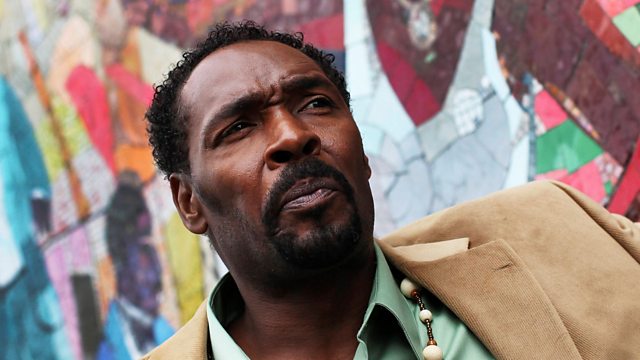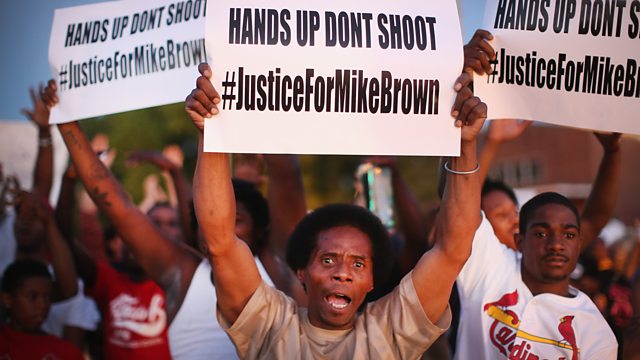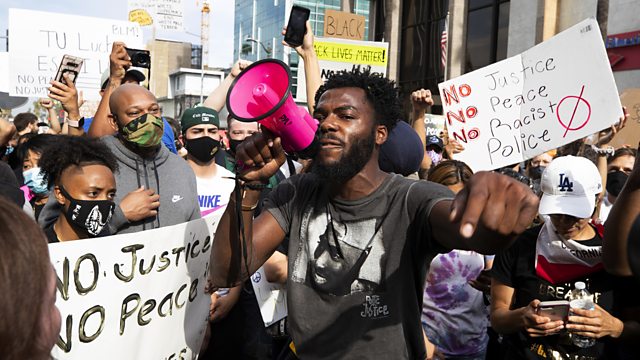
Live on the edge
To have a life with many dangers and risks, especially because you like to behave in an extreme and unusual way
Despite the apparent respectability, he was a man who liked to live on the edge.
Macmillan Dictionary
Living on the edge New Word Suggestion
Taking a risk above and beyond what most people would do. Pushing your horizons be it physical, mental or otherwise. This is a common trait among dare-devils and over-the-top sports enthusiasts.
Collins
Page description
Explore ‘Living on the Edge,’ a concept that delves into the thrill and risks of embracing a daring lifestyle and pushing boundaries.
Rodney King and the LA riots
Witness History
People took to the streets of Los Angeles in fury after police, who had assaulted a black driver called Rodney King, were acquitted in 1992. His assault had been captured on video and played repeatedly on US television. In 2012 Nina Robinson spoke to Rodney King about the beating, the trial of the police, and the anger and mayhem that followed their acquittal.
Photo: Rodney King in 2012. Credit: REUTERS/Shannon Stapleton

Why Do US Cops Keep Killing Unarmed Black Men?
The Inquiry
Recent high profile cases of unarmed black men dying at the hands of the US police have sparked outrage, protests and civil unrest in several American cities. The deaths of Michael Brown, Eric Garner, Walter Scott and Freddie Gray are – some claim – evidence of long-standing problems with police racism and excessive violence. But what do we really know about what’s happening? Our expert witnesses this week explain the issues of racism, bias and police use of force. And the head of President Obama’s taskforce on police reform, Charles Ramsey, tells us that fixing the problem will involve much more than just fixing the police.
(Photo: Demonstration in St Louis, Missouri, following the shooting of Michael Brown. Credit: Scott Olson/Getty Images)

Why do US cops keep killing unarmed black men?
The Inquiry
Why is George Floyd the latest in a long line of unarmed black men killed by US police? Studies show black men are three times more likely to be killed by police in America than white people.
With Helena Merriman.
(A man speaks into a bullhorn as demonstrators march in Los Angeles, California. 2 June 2020. Brent Stirton/Getty Images)
5 jun. 2020
2 Former FBI assistant director says Derek Chauvin should have never been hired as police officer
5 jun. 2020
3 Derek Chauvin charged with third degree murder in death of George Floyd
30 mei 2020
Former Minneapolis police officer Derek Chauvin has been arrested and charged with third degree murder and manslaughter in the death of George Floyd. The case has triggered protests in cities across the country. Jeff Pegues reports.
Mededeling Video met leeftijdsbeperking (op basis van communityrichtlijnen)
4 THE STORY OF DEREK CHAUVIN (George Floyd’s Killer)
5 jun. 2020
1 jun. 2020
6 George Floyd Murder Case | Is Derek Chauvin Guilty of First Degree Murder?
5 jun. 2020
9 jun. 2020
8 A lying undercover agent arrested 46 people, most of them black, on drug charges
22 jun. 2020
60 Minutes, the most successful American television broadcast in history, began its 52nd season in September. Offering hard-hitting investigative reports, interviews, feature segments and profiles of people in the news, the broadcast began in 1968 is still a hit in 2020. 60 Minutes makes Nielsen’s weekly Top 10 nearly every week and was the #1 weekly television broadcast three times last season.
The program still averages more than 10 million viewers, more than double the audience of its nearest network news magazine competitor. The average audience for a 60 Minutes broadcast is 150% higher than those of the network morning news programs; the audience dwarfs the number of viewers drawn by the most popular cable news programs.
About a million more people listen to the 60 Minutes radio simulcast in several major cities and on its companion podcast. Tens of thousands each week experience 60 Minutes online. The broadcast’s segments can be watched at 60Minutes.com and on the CBS All Access app. Its webcast, 60MinutesOvertime.com, offers content originally produced for the web, including behind-the-scenes video about the production of 60 Minutes stories and timely archival segments.
60 Minutes has won every major broadcast award. Its 25 Peabody and 150 Emmy awards are the most won by any single news program. It has also won 20 duPont-Columbia University journalism awards. Other distinguished journalism honors won multiple times include the George Polk, RTDNA Edward R. Murrow, Investigative Reporters and Editors, RFK Journalism, Sigma Delta Chi and Gerald Loeb awards.
60 Minutes premiered on CBS September 24, 1968. Bill Owens is the program’s executive producer. The correspondents and contributors of 60 Minutes are Sharyn Alfonsi, Anderson Cooper, John Dickerson, Norah O’Donnell, Scott Pelley, Lesley Stahl, Bill Whitaker and L. Jon Wertheim.
9 Black history “travesty of justice – texas case 1999 – 2003”
23 aug. 2010
A miscarriage of justice primarily is the conviction and punishment of a person for a crime they did not commit. The term travesty of justice is sometimes used for a gross, deliberate miscarriage of justice. Miscarriage of justice” is sometimes synonymous with wrongful conviction, referring to a conviction reached in an unfair or disputed trial.
This case appears to be a Travesty of Justice followed by 46 wrongful convictions. A Corrupt investogator Tom Coleman arrives in a small Texas town and begins to carry out of survelliance of local drug dealers. In 1999 a police raid based on this evidence arrested 46 mostly black men. It transpires that Tom Colemans Surveillance was falsified and many of the undercover deals he maintained he carried out were clear fabrications and inventions.
Only one white farmer Gary Gardner from this once segregated town took a stand against this injustice and helped bring this terrible miscarrriage to light through his own investigation. When Bob Herbert a columnist for the new York Times got involved he was shocked by not only the investigation but the Trials in Court where a wrongful conviction awaited each accused
10 Travesty of Justice~ Texas Case ~ Corrupt Investigator – Part 2 of (3)
23 aug. 2010
A miscarriage of justice primarily is the conviction and punishment of a person for a crime they did not commit. The term travesty of justice is sometimes used for a gross, deliberate miscarriage of justice. Miscarriage of justice” is sometimes synonymous with wrongful conviction, referring to a conviction reached in an unfair or disputed trial.
This case appears to be a Travesty of Justice followed by 46 wrongful convictions. A Corrupt investigator Tom Coleman arrives in a small Texas town and begins to carry out of survelliance of local drug dealers. In 1999 a police raid based on this evidence arrested 46 mostly black men. It transpires that Tom Colemans Surveillance was falsified and many of the undercover deals he maintained he carried out were clear fabrications and inventions.
Only one white farmer Gary Gardner from this once segregated town took a stand against this injustice and helped bring this terrible miscarrriage to light through his own investigation. When Bob Herbert a columnist for the new York Times got involved he was shocked by not only the investigation but the Trials in Court where a wrongful conviction awaited each accused.
Information about miscarriages of justice:
A miscarriage of justice primarily is the conviction and punishment of a person for a crime they did not commit. The term travesty of justice is sometimes used for a gross, deliberate miscarriage of justice. Miscarriage of justice” is sometimes synonymous with wrongful conviction, referring to a conviction reached in an unfair or disputed trial.
Causes of miscarriages of justice include:
Plea bargains that offer incentives for the innocent to plead guilty
Confirmation bias on the part of investigators
Withholding or destruction of evidence by police or prosecution
fabrication of evidence or outright perjury by police (see testilying), or prosecution witnesses (e.g. Dr Charles Smith)
Biased editing of evidence
Prejudice towards the class of people to which the defendant belongs
Poor identification by witnesses and/or victims
Overestimation/underestimation of the evidential value of expert testimony
Contaminated evidence
Faulty forensic tests
false confessions due to police pressure or psychological weakness
Misdirection of a jury by a judge during trial
perjured evidence by the real guilty party or their accomplices (frameup)
Perjured evidence by supposed victim or their accomplices
Conspiracy between court of appeal judges and prosecutors to uphold conviction of innocent
11 Miscarriages of justices ~ Texas case ~ Corrupt Investigator – Part 3 of (3)
23 aug. 2010
A miscarriage of justice primarily is the conviction and punishment of a person for a crime they did not commit. The term travesty of justice is sometimes used for a gross, deliberate miscarriage of justice. Miscarriage of justice” is sometimes synonymous with wrongful conviction, referring to a conviction reached in an unfair or disputed trial.
This case appears to be a Travesty of Justice followed by 46 wrongful convictions. A Corrupt investogator Tom Coleman arrives in a small Texas town and begins to carry out of survelliance of local drug dealers. In 1999 a police raid based on this evidence arrested 46 mostly black men. It transpires that Tom Colemans Surveillance was falsified and many of the undercover deals he maintained he carried out were clear fabrications and inventions.
Only one white farmer Gary Gardner from this once segregated town took a stand against this injustice and helped bring this terrible miscarrriage to light through his own investigation. When Bob Herbert a columnist for the new York Times got involved he was shocked by not only the investigation but the Trials in Court where a wrongful conviction awaited each accused
12 TULIA 46: Impacts 20 years later
13 Victims Find Out Their Partners Are FBI Agents
4 apr 2020
We don’t want to attack anyone, but how in love can you be if you didn’t realize your partner worked for The Bureau?
10 apr. 2011